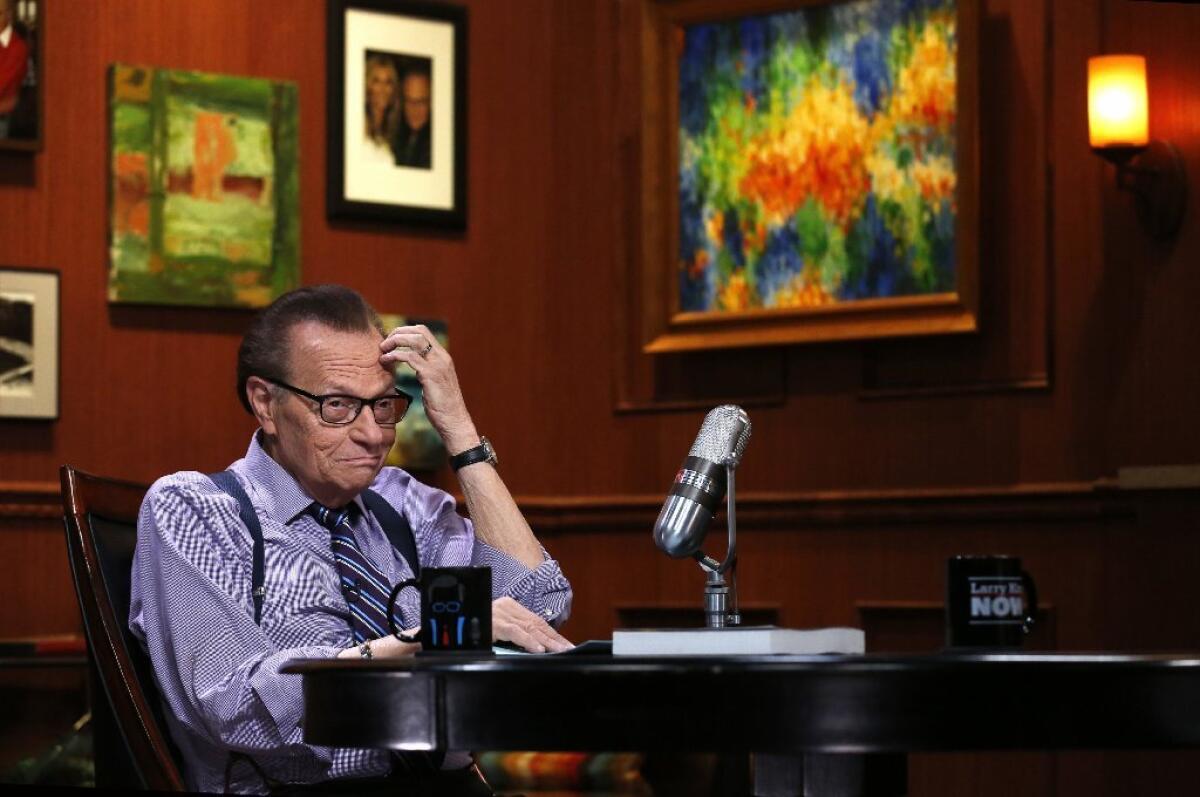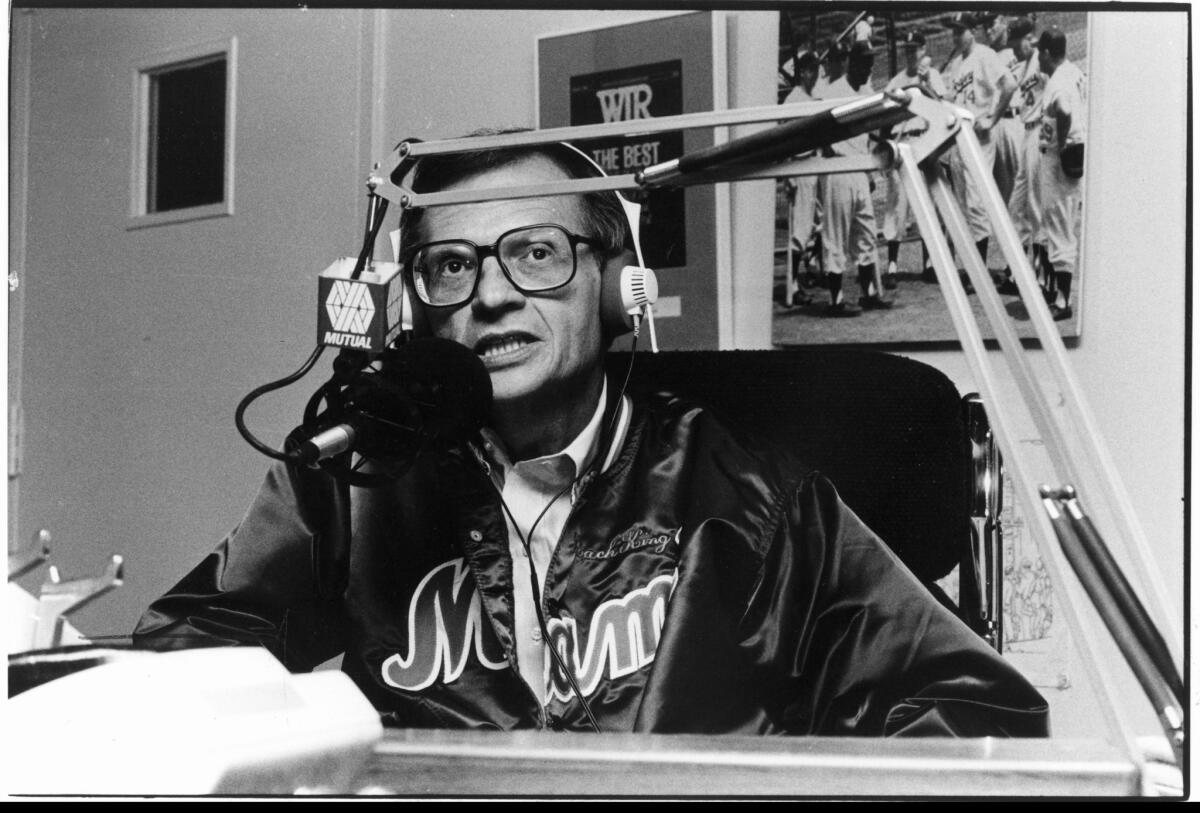Even after nearly 60 years, Larry King doesn’t say no to interviews. Why? His ‘insatiable’ curiosity

- Share via
"Welcome aboard," said Larry King, the great American interrogator. I had come to watch him at work, which was also to watch him at play.
He was taller than I'd expected from TV, where he tends to slouch in his chair or hunch over his desk while he conducts his interviews, of which there have been several tens of thousands over what, next May, will be 60 years in the talking business.
At 82, King, whose "Larry King Live" was a top-rated weeknightly staple of CNN for a quarter century, is now a man of the Internet. Having unsuccessfully retired from broadcasting in 2010, he was back just two years later with the thrice-weekly "Larry King Now," which lives on Ora TV, an on-demand digital network King created in partnership with Mexican billionaire Carlos Slim. More than 650 episodes have been made so far and are available through its own site and via the streaming service Hulu.
King is a chimerical figure: part newsman, part entertainer, part personality and part ordinary troubled human. With a career that has encompassed radio, television, print, personal appearances, social media and the Internet, you could call him serially multi-platform.

"I'm amazed at how long I've been doing this," King said. "I've been distributed by a phone line, cable, satellite, Internet, but I am basically doing the same thing I've always done, sat down and asked people questions."
I am a late-arriving Larry King fan. In his omnipresent prime, he was such a part of the landscape that he was easy to miss. In his post-CNN, online incarnation – which feels more essential, maybe, because it’s less “important” – I have come to appreciate just how good he is at what he does, which is to say how much what he does is an expression of who he is.
PHOTOS: Larry King: Notable interviews »
All King needs to do his work is a table and a couple of chairs, and he’s shot episodes in New York, Park City, Utah, and London. But home base is the Ora studio, an efficient digital mini-complex in a converted church rectory in Glendale.
"If you want to talk over here we can start whenever you want," King said from the makeup chair. Everything in the studio was two steps from everything else.
"The makeup ritual," said King. "Ever since Miami." That’s where he got his start, in radio, on May 1, 1957.
Does he get any kind of pleasure from it? I asked.
"No. Mostly it's someone touching your face for 10 minutes,” he said. But he had kind words for the makeup artist, and for his young Ora crew.
His phone rang. He uses a flip phone, he likes to point out. He doesn’t like smartphones, because he sees his friends and relations ruled by them. Believing himself to have an addictive personality – he smoked three packs of cigarettes a day for years, until a heart attack got him to quit, and says he is "addicted to work" – he does not want to go down that road.
"Hello," King said, answering, while the makeup continued. "OK, I got a call in to Wolfgang. So I'll talk to him and I'll put you directly in touch with him… I'm in L.A. …. Well I'm in New York the day before but I could fly right in and do it … Sure … Call Dave, he handles the Dalai Lama, he'll tell you how we reach him."
If he doesn't have quite as powerful a platform at Ora as CNN provided, he has no trouble finding interesting, suitably celebrated people to talk to. Visitors in his fourth season – the fifth begins this month, with no break to speak of – have included Dan Rather, 50 Cent, Tim Tebow, Eve, Stephen Hawking, Wendy Williams, Robert Redford, Marcia Clark, Joanna Newsom, Tracee Ellis Ross, Grace Helbig and Spike Lee, with panel shows on HIV/AIDs, social media and "the state of faith."
The show is friendly – adversarial journalism is famously not his style, notwithstanding his sometimes prosecutorial delivery -- but energetic. That is not to say it’s lightweight. As King’s fellow host and friend Craig Ferguson told me via email, “Larry is disarmingly charming and clever. He pretends to be gullible as he allows you to make a horse’s ass of yourself. This is a technique I've seen him use to devastating effect on pompous [individuals] over and over again.”
Finished with makeup, King went to the set, inspired by his "trophy room" at home. The musician Moby was to be his guest; King had not heard of him. A young producer knelt down beside him and gave a minute-long class in Moby 101, then left King with a couple of pages of notes. It isn’t unusual, when interviewing unfamiliar subjects, for the host to preface a question with, “I understand that," "I'm told that," or "There's a note here."
“I like talking to people I've never met before. I had no idea who Moby was. I liked him a lot. I liked his thought process; he was fun, he was transparent."
— Larry King
Afterward King declared the interview a success. “I like talking to people I've never met before. I had no idea who Moby was. I liked him a lot. I liked his thought process; he was fun, he was transparent."
Was that a typical briefing?
King said that it was and that it had a lot to do with how he started as an interviewer, hosting a midmorning show from a Miami restaurant. "I couldn't prepare because I didn't know who was coming. I shun too much preparation. I don't want to know the answer to a question I'm going to ask. I like to be surprised.
"My friend Herbie Cohen, who I had breakfast with today -- we met when we were 10 -- he said, 'You know the secret of your success? Dumb.' By dumb, he means, 'Help me. I don't understand. Why? Why did you do that?'"
This means that King asks questions that can seem obvious or ill-informed. “Why was it called the Smiths?” Larry asked the singer Morrissey of his old band, in a rare interview last year. “Your name is not Smith.” (He also asked him, “You like Sinatra?” King loves Frank Sinatra.) It also means he gets answers other interviewers never will.
Even as he seems to be the last of his breed, King is both a godfather to and participant in a new generation of conversational broad- and podcasters. He has 2.69 million followers on Twitter, which is about a million more than he told me he had. “I call them in and they send them out,” he said of his tweets, some of which, marked with the hashtag #my2cents, form a miniature version of his old USA Today column.
Most guests are booked at the suggestion of his producers, King said, which accounts for the hip-hop and YouTube stars who sit across from him, "but I've never turned down a show, because of my curiosity; it's insatiable. Now, when I'm sitting down to interview a soap opera star, I might not be looking forward to it as much as if it were a major political figure. But once the light goes on, my curiosity kicks in and I'm in the moment. It's a kind of escape, almost.”
King has lived in four cities – Brooklyn, where he was born Larry Zeiger in 1933 and grew up poor and fatherless; Miami, where he started his career; Washington, D.C., where CNN's "Larry King Live" made him an international celebrity; and Los Angeles, where he came, in 1995, to cover the O.J. Simpson trial, fell in love, got married and stayed married.
Shawn Southwick is his seventh wife (in eight marriages). The couple shares teenage sons – this gives King something in common with some guests half his age – and a weekly podcast, "Back & Forth with Shawn & Larry King," in which they affectionately mock and talk over one another. It is introduced as a show "where a TV and radio icon and his multi talented, beautiful and much younger wife interview celebs and newsmakers and pull back the curtain on what goes on in their home life."
See the most-read entertainment stories »
King had to leave to shoot "PoliticKING with Larry King" – his other, twice-weekly Ora interview show, which focuses on current events -- so I met him again a few days later at his home in the flats of Beverly Hills. We sat in his actual trophy room, which he called "my ego room. When I'm feeling low I come here." Among the awards and certificates, letters from and photos with world famous figures, baseball and Sinatra memorabilia was an antique manual typewriter, a gift from Shawn. It was the same sort he used to type his USA Today columns.
"I miss the typewriter," he said. "I miss the rotary phone. I still look for phone booths."
He is an old-fashioned guy. He likes newspapers ("I love to hold the paper, I like print on my fingers") and reads five every morning. ("The Internet," he asked me. "Where is it?") He doesn't like texting. "I understand how it can be very valuable. It's a great way to say no. But I find that 95% of people are using it not to talk to somebody. I like talking. I like the phone. But the world is changing, boy."
One feels at times that the show is a kind of research project King uses to make sense of that changing world. Lately, he’s been asking his guests what they make of Donald Trump, with whom he is friendly ("Donald called me – 'I'm on a security line'"), but who clearly disturbs him politically.
But his most compulsive inquiries are into death. His chronological peers are inevitably asked what they think about getting older, dying and what follows it.
"I can't believe I'm 82. When I was a kid no one was 80. You retired at 65, you died at 67.” A doctor had recently told him, "You'll make 90 easy." “That's only eight years,” King replied.
"I can't believe I'm 82. When I was a kid no one was 80. You retired at 65, you died at 67.”
— Larry King
"My wife is a devout Mormon,” King said, “and so she believes she's going somewhere. And I can't make that leap. Maybe my brain gets in the way. Or maybe I've interviewed too many religious leaders and never got answers. And I'm a person who lives on answers."
On one recent “Larry King Now,” he asked guest William Shatner how he would like to be remembered.
"We're not going to be remembered, Larry, OK? It's gone. Dust."
"That's the terrible thought to me. To not exist."
"That's right. And do you ponder that sometimes?"
"Ponder it sometimes?” King cried as if he had just been thrown a question too obvious even for Larry King to ask. “All the time!"
MORE:
Larry King has a new home goods collection called Sleep Like a King
From the archives – Larry King: All talk, no questions with Cadee Condit and Anne Heche
From the archives: Talk-show host Larry King is a man of the people
The complete guide to home viewing
Get Screen Gab for everything about the TV shows and streaming movies everyone’s talking about.
You may occasionally receive promotional content from the Los Angeles Times.




